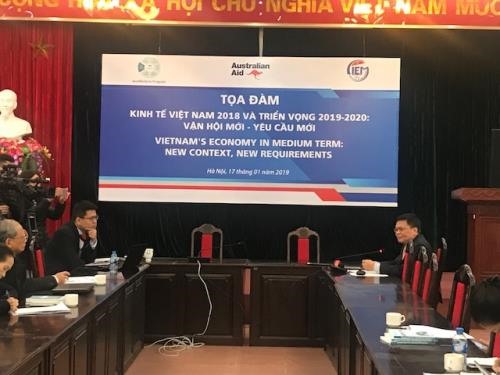Viet Nam has experienced a year of socio-economic achievements. For example, economic growth continues at a high level; the macroeconomic environment remains stable; and the State budget deficit is stable.

Viet Nam has experienced a year of socio-economic achievements. For example, economic growth continues at a high level; the macroeconomic environment remains stable; inflation is under control; the trade surplus is at record levels; and the State budget deficit is stable.
The statement was made by Nguyen Dinh Cung, director of the Central Institute for Economic Management (CIEM), at a conference held in Ha Noi on Thursday.
“More importantly, the macroeconomic foundation continues to be strengthened, the balance of monetary and fiscal governance is maintained even in the context of external shocks and cyclical growth risks. Therefore, Viet Nam still has favourable conditions to conduct fundamental reforms to economic institutions as well as its business environment," Cung said.
According to CIEM’s report, in 2019, Viet Nam’s GDP growth is forecast at 6.93 per cent, export growth is estimated at 9.4 per cent, trade surplus at US$2.04 billion and the average consumer price is expected to increase about 3.88 per cent.
The report also analyses the effects of the fourth industrial revolution and the country’s readiness to participate in the revolution. As a result, it concludes that Viet Nam will see great benefits from participating in Industry 4.0.
Participation in the fourth industrial revolution will determine the pace of economic restructuring, while transforming the growth model to achieve higher productivity, better competitiveness and greater levels of prosperity, said Nguyen Anh Duong, from CIEM’s Macroeconomic Policy Department.
In addition to improving the business environment in accordance with international practices and developing sectors with comparative advantages, Viet Nam should focus on improving technology, innovation and quality of human resources as well as the quality of public services, Duong suggested.
The confidence of the domestic and foreign business community continues to increase after the Government’s commitment to reform as well as the ability of the Government to respond effectively to external shocks. New free trade agreements (CPTPP, EVFTA, RCEP) can create additional impetus for reform and access to resources (skills, technology, capital) from the outside.
According to CIEM’s director, Viet Nam should continue to handle the fundamental challenge of institutional quality, infrastructure and human resources. Strategic competition between the US and China continues, forcing Viet Nam to consider more carefully its participation in initiatives involving these two countries. Economic, trade and investment activities may face a number of uncertainties, especially in the first half of 2019, due to the risk of economic decline in many key economies.
Cung also emphasises that policy should continue to focus on improving microeconomic foundations and innovating economic institutions in the direction of being more friendly to the environment, and effectively handling risks in a volatile international economic environment.
The event was organised by CIEM in cooperation with the Australian-funded programme Aus4Reform. — VNS




